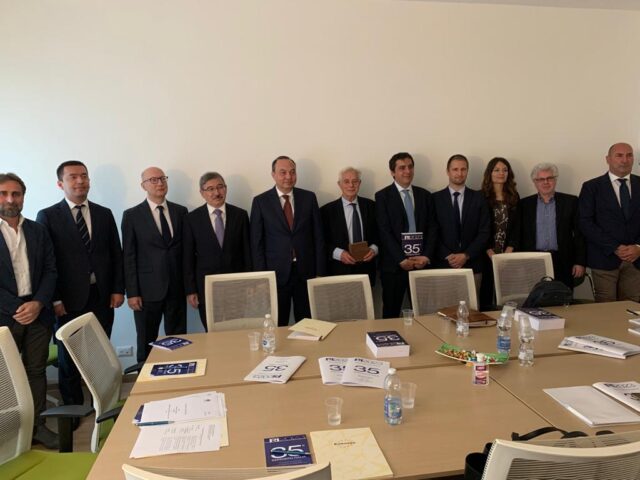SpecialEurasia joined Eurispes in the Uzbek-Italian permanent working table

Considering its geopolitical role in Central Asia and recent official meetings and visits between Italy and Uzbekistan, SpecialEurasia has always considered fundamental deepening the knowledge of Uzbek internal dynamics and foreign affairs.
In this framework, on May 29th, 2023, in Rome, SpecialEurasia Managing Director, Silvia Boltuc, and Research Manager, Giuliano Bifolchi, had a meeting with an Uzbek delegation and official representatives of the Italian institute Eurispes to better understand the Central Asian republic’s strategic role and investment opportunities and possibilities of cooperation between Rome and Tashkent.
Eldor Tahirovich Aripov, Director of the Institute of Strategic and Regional Studies under the President of Uzbekistan, led the Uzbek delegation composed by Sherzod Miraglamovich Fayziyev, Deputy Director of the International Institute for Central Asia, Umid Kutpitdinovich Abidkhodjaev, Director of the Institute for Macroeconomic and Regional Studies, Donier Javdatovich Kurbanov, Director the Information and Analytical Center for International Relations under the Ministry of Foreign Affairs of the Republic of Uzbekistan, and Oybek Gayratovich Shahavdinov, Head of Department for cooperation with European countries and the EU institutions of the Ministry of Foreign Affairs of Uzbekistan.
On behalf of Eurispes, the Secretary General, Marco Ricceri, and the members of the Institute’s Board of Directors, lawyers Angelo Caliendo and Roberto De Vita, brought the welcome greetings of President Gian Maria Fara and illustrated the main findings of the 35th Italy Report, which has just been published. They
All the participants stressed the increasing Uzbek-Italian diplomatic and economic relations and shared opinions and insights to boost relations between these two countries and contextualise regional geopolitical dynamics.
Silvia Boltuc and Giuliano Bifolchi informed the Uzbek and Italian colleagues about SpecialEurasia’s projects and analytical work on Central Asia, especially Uzbekistan, focusing on recent geopolitical events such as the first “China-Central Asia” Summit and the second economic forum “EU-Central Asia”.
Talking about Uzbekistan, SpecialEurasia’s representatives emphasised the necessity of improving communication between the parties to produce concise and clear report and information useful for Italian, Uzbek and foreign audience.
Indeed, although Uzbekistan has become a significant target for Italian diplomacy and investors, the lack of information and knowledge among the Italian communities still represents an obstacle.
Uzbekistan: geopolitics and relations with Italy
Uzbekistan, a Central Asian country, is geopolitically significant because of its location at the crossroads of major historical and modern trade routes, including the ancient Silk Road and current energy pipelines. The country shares its borders with Kazakhstan, Kyrgyzstan, Tajikistan, Afghanistan, and Turkmenistan, making it an important strategic partner for neighbouring countries and global powers.
Its location and resources contribute to Tashkent’s geopolitical importance, as does its political system and foreign policy. Since 2016, when Uzbek President Shavkat Mirziyoyev came to power, there has been a shift toward modernisations, democratisation, opening up to the world and pursuing more active foreign policy, including greater engagement with China, Russia, and the United States.
Italy and Uzbekistan have maintained diplomatic relations since Uzbekistan’s independence from the Soviet Union in 1991. The two countries share a long and rich history, with cultural exchanges dating back to the ancient Silk Road trade route.
In recent years, Rome and Tashkent have strengthened their political, economic, and cultural ties through various bilateral agreements and partnerships.
As the Italian Ambassador to Tashkent Agostino Pinna recently stressed, since 2017, an impressive “reformist turn” has begun in Uzbekistan. The new constitutional reform has laid even stronger foundations for a market economy: fundamental freedoms and guarantees of business activities are being strengthened, and protecting private property is being strengthened.
According to the diplomat, it is in such a dynamic and consistently developing a paradigm that Italian-Uzbek relations flourish. Thus, at the end of 2022, trade increased by 32%, reaching 535.4 million euros, which made Italy the third major European trading partner for Uzbekistan.
As SpecialEurasia reported in 2022, Italy recently discussed further cooperation with Uzbekistan, showing Rome’s attempt to play a more influential role in Central Asia by being engaged in a strategic market where Italian companies might export their know-how and products while the Italian authorities might diversify trade and energy imports.
For further information, analyses, and reports about Uzbekistan, contact us at info@specialeurasia.com.
